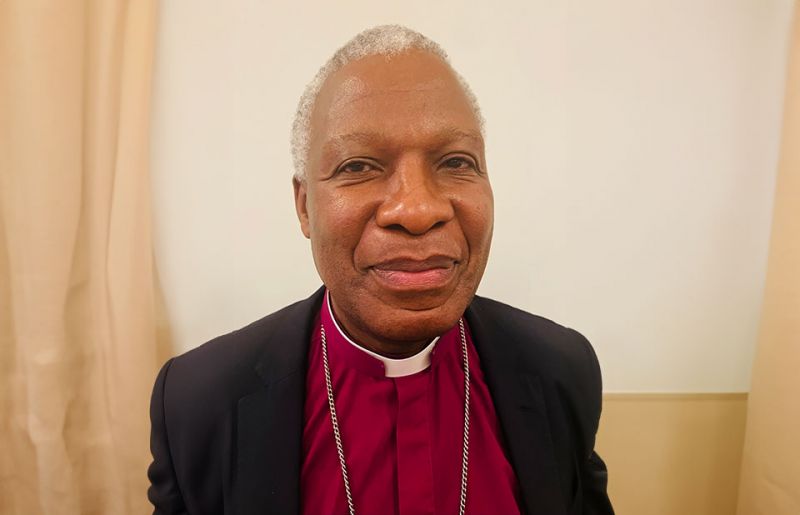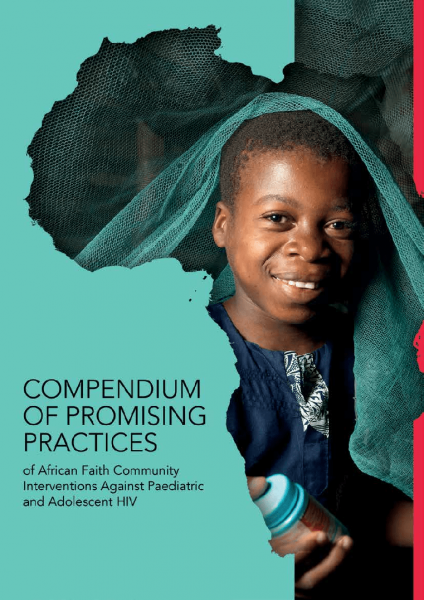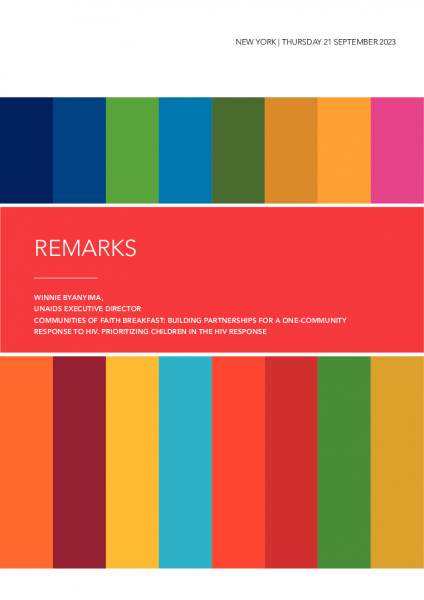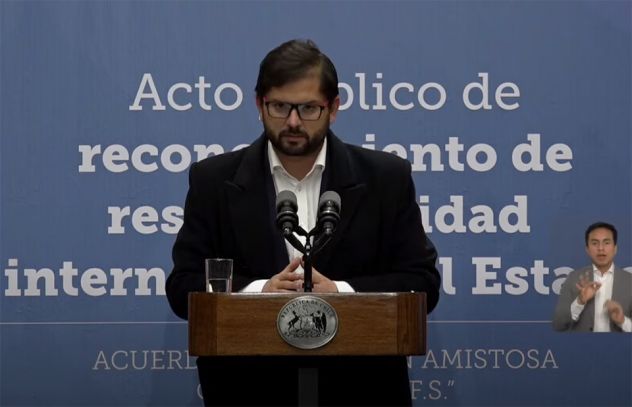Cabinet Secretary, Acting Governor James Nyoro, colleagues from the United Nations system. Jambo!
Community health volunteers, you are my heroes. I am so happy to be here with you today in Kiambu County, Kenya.
And I thank you for the warm welcome from the heart of your community at the launch of the UNAIDS report, Power to the people.
Thank you, young people. Especially the young person with a disability who just spoke to us, who reminded us that not all people living with HIV are the same—they are all different, and we must be inclusive. We will remember it. We will act on it.
I want to express my sincere condolences and solidarity with the people of West Pokot on the tragic loss of life and property following the torrential rains and landslides. I hurt with you.
Launch of Power to the people
I am here because Africa is the continent still most affected by the HIV epidemic.
More than 25 million people are living with HIV in sub-Saharan Africa—more than two-thirds of the global total of 37.9 million people living with HIV.
I am also here because many countries in Africa are leading the way to end AIDS. We are heroes, fighting the epidemic.
In Kenya, AIDS-related deaths have fallen by more than 50% since 2010, and new HIV infections are down by 30%. This is a great achievement. Great progress in a short time.
Today, I can announce that 24.5 million people living with HIV around the world now have access to life-saving treatment. Great news and great progress.
Joining the marathon to end AIDS
This is a special day for me.
I am launching my first UNAIDS report.
With this new report, I am paying tribute to the families and communities devasted by AIDS, the women’s grass-roots groups and the communities that have mobilized and transformed the AIDS response. I congratulate you. We owe you a lot.
In my country, women got together in villages, bought saucepans and blankets, looked after each other, buried the dead, didn’t let anyone suffer alone. It was the women in our communities who did that.
Today, I am committing UNAIDS to take some big steps in a new direction.
Fight inequality and poverty
The first step is to address inequality and the injustices that fuel the HIV epidemic.
AIDS hurts people who live in poverty. This is a problem for everyone, but a big problem for the poor.
We have to address inequality. It cannot be right that some people get treatment and live long lives, while others cannot access health care and die.
We must fight inequality, lift all people up out of poverty.
We need to provide more services—education, health, social protection. That is how we will end AIDS.
Gender equality and women’s rights are key
We must advance women’s rights if we are to end AIDS, so our second big step in the race to end AIDS must be to tackle gender inequality.
Despite progress in prevention and treatment, HIV remains the leading cause of death for women aged 15–49 years worldwide.
Every week, 6000 young women aged 15–24 years are newly infected with HIV.
Across sub-Saharan Africa, young women and girls face rates of HIV far higher than men and boys.
Young women in sub-Saharan Africa aged 15–24 years are twice as likely to be living with HIV than men of the same age.
These are numbers that shame us all.
This is a gender injustice with tragic repercussions. Why are young women more vulnerable?
If we are going to keep our promises, we must end the gender power imbalances that are driving HIV risk and vulnerability.
We need to champion gender equality and empower young women and girls to transform our societies.
Worldwide, one in three women will experience physical or sexual abuse in her lifetime.
In too many of our communities, a women’s first experience with sex is violent, is forceful. That is the reality.
Yesterday, we launched 16 days of activism against gender-based violence. Every day we should commit to achieve equality for women and girls, so their vulnerability to violence can end.
Here in Kenya, I am concerned about the rate of femicide.
Every week, we read a media report of a woman, often a young woman, killed by her partner.
We need to speak up for these women, call for justice and an end to impunity. The world must be a safe space for all of us.
UNAIDS will pay more attention to fighting those laws, traditions, cultures and practices that enable and perpetuate gender-based violence. A woman’s body is her body.
It is our urgent duty to ensure that all women and girls, of all ages, have unrestricted access to sexual and reproductive health services.
We cannot accept that millions of women still cannot get access to contraceptives, because we know that their right to contraception is core to their empowerment across every aspect of life.
We are doing an injustice to millions of young people who still cannot access the simple health services they need: free condoms, an HIV test without parental consent and pre-exposure prophylaxis.
Keeping girls in school reduces their risk of HIV. We need to ensure that all young people can stay in school, and that every school provides quality comprehensive sexuality education—to know about their bodies, their health.
UNAIDS, together with our Cosponsors—the United Nations Population Fund, the United Nations Entity for Gender Equality and the Empowerment of Women, the United Nations Educational, Scientific and Cultural Organization and the United Nations Children’s Fund—will step up for women and girls, especially in Africa.
Human rights
The third step I ask us to take today is on human rights.
The human rights and citizen rights of women and girls, gay men and other men who have sex with men, transgender people, sex workers, people who use drugs and prisoners are being denied.
Without judgement, we must ensure that they can access HIV services, so this disease can end. We must treat them as equal citizens, so they can enjoy their right to health and get services to protect themselves and their partners from HIV.
One third of key populations do not know their HIV status.
In many countries, we still have laws that criminalize key populations or discriminate against people living with HIV, so they go underground and hide, and when they hide they can’t enjoy their right to health.
The crackdowns and restrictions on gay, bisexual, transgender and intersex groups and campaigns are unacceptable.
Young people are being judged and punished for who they are and who they love.
We will not end AIDS unless we guarantee the human rights of all people, especially key populations.
Funding and resources
Despite progress in recent years, there are still not enough resources available to end the AIDS epidemic. Poor countries are struggling to pay for everything they need—health, education, roads, water, sanitation.
Health should be a top priority. Without healthy people, we will not make progress.
Two-thirds of countries in Africa still charge fees for health care, and millions of people are just one sickness away from falling into extreme poverty.
Despite the world’s commitment to implement universal health coverage, the percentage of people paying catastrophic health costs out of their pocket has only increased in the past five years. Health cannot be a privilege for the rich—it should be a right for everyone.
Public debt has climbed above 50% of gross domestic product in half the countries in sub-Saharan Africa. In a constrained fiscal space, governments must find pathways to a sustainable long-term financing of their HIV responses. We want to work with governments to see how to create fiscal space and manage their priorities within budgets reduced by debt repayments.
During the recent replenishment of the Global Fund to Fight AIDS, Tuberculosis and Malaria, countries and foundations made a historic down payment to advance the end of AIDS. But more work is also needed to ensure that every dollar, euro and shilling is being used effectively.
In many middle-income countries, governments are still paying thousands of dollars more for the same quality medicines that are available to low-income countries for just pennies a day. This is unacceptable. We will try hard to see that prices come down.
Universal access to quality health care is not a commodity—it is a human right.
Conclusion
I do not underestimate the challenges ahead, but I feel a lot of excitement about what can be achieved for people. We are standing on the shoulders of people who fought—how can we fail to finish?
What I have called for today requires some urgent changes.
Changes in how we think what is possible.
Health care for each and every person—this is not impossible.
Changes in how quickly we act.
Changes in how we work as UNAIDS—we need to look at ourselves in the mirror.
But let us be in no doubt, we can end AIDS.
I’ve lost loved ones.
We can go into a future of health for all.
Cabinet Secretary and all the activists here today, I wish you all the best in your endeavours. UNAIDS is right behind you.








